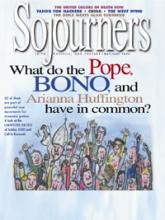There’s this terminally hip bar, I can’t remember the name, and I’m drinking too much gin, smoking cigarettes that don’t belong to me, and—here’s my confession—reading aloud from The Gospel According to John. Those I’m reading to, they’re friends mostly, and friends of friends, and I doubt a single one of them believes any more than I do in God-the-Almighty, let alone in Jesus Christ. A blond girl named Lauren takes the book away from me, but only so she can read for herself. "It’s almost Ginsberg," she sighs.
I’ve been carrying John in my coat pocket all week, ever since it came in the mail from Grove Press, along with the three remaining gospels, Genesis, Exodus, and six more installments of the Bible, each individually bound in slick trade paperback. There was a press release, too. "The most radical approach to the Bible since Gutenberg," it said. And in that terminally hip bar, listening to Lauren read John 20:11, I begin to believe the hype.
They’re called Pocket Canons, and they’re priced at $2.95 apiece. Each one has a celebrity introduction, followed by the King James text, from which not a single thy, thou, or thine has been omitted. They’re slimmer than a Palm Pilot, and not much bigger all around. In England, nearly a million copies have sold.
Even the planned first U.S. printing of 600,000 should be enough to put a Canon in the pocket of every post-ironic street cynic from Manhattan to San Francisco. The most radical approach since Gutenberg: If infidels like Lauren start reading the Bible, if this Jesus character catches on the way that, say, Harry Potter has, humanity’s greatest work of literature—the cornerstone of Western culture and of Judeo-Christian morality—may just be freed from the hands of bigotry.
Read the Full Article
